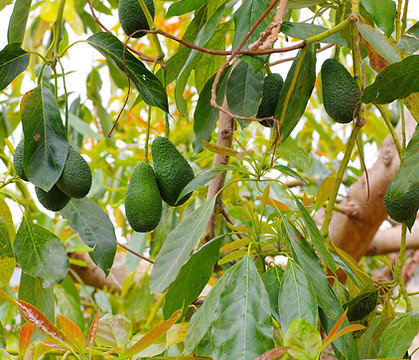
Avocado
Avocado is grown in more than 50 tropical and subtropical countries and is still gaining in importance due to its nutritional and beneficial nature. It has many health benefits, including helping to prevent eye diseases and lowering unhealthy cholesterol levels as well as high content of powerful antioxidants. That’s why it’s very popular and produced all over the world.
Nutrition and bioactive compounds
Pulp represents 50 - 80% in different avocado varieties. It contains roughly 67-78% moisture, 5-35% lipids, with a major portion of unsaturated fatty acids (60-85%), 1-9% carbohydrates, 1-3% protein, 1.4-9% fibre, sugars (0.3%), and energetic value between 140-2300 kcal.
Pulp has a high concentration of potassium, which regulates muscle activity and protects the body from cardiovascular diseases, and is a good source of phosphorus, magnesium, calcium, and sodium, zinc and iron.
Avocado contains many beneficial compounds that act as antioxidants: pigments (i.e., carotenoids, especially lutein), phenolic compounds, phytoestrogens, polyphenols, tannins, vitamins B, A, C, E and K1, glutathione and β-sitosterol.


Cultivation
Avocados are cultivated in tropical and Mediterranean climates of many countries. Depending on the variety, avocados have green, brown, purplish, or black skin when ripe, and may be pear-shaped, egg-shaped, or spherical. Persea americana is a tree that grows to 20 m (66 ft) high. As a subtropical species, avocados need a climate without frost and with little wind.
Avocado cultivation is generally very water demanding and produces a large quantity of peels and seeds, which have been long considered as a waste but are actually a rich source of phytochemicals that reduce the inflammatory diseases. The residues of avocado contain essential oils with considerable content of polyphenolic compounds. Seeds are a good source of carbohydrates like hemicelluloses, fibres, and starch (30%).
Uses
Pulp: food and food products (i.e., guacamole).
Oil: possible substitute of olive oil due to its health benefits, pharmaceutical and cosmetics industry.
Leaves: rich source of phytochemicals for pharmaceutical and cosmetics industry.
High fibre content of the residues after lipid extraction allows their use in preparation of flour, which is suitable for bakery products and pasta.
Market and production
Worldwide production in 2020 (FAO): more than 8 million tonnes, in Africa more than 1 million tonnes (13.3%), EA almost 700k tonnes.
Main producing countries in the world: Mexico, Colombia, Dominican Republic.
Main producing countries Africa: Kenya, Ethiopia, Malawi, South Africa
The Netherlands, France and United Kingdom are the markets with the greatest potential for Africa’s exports of avocados.
